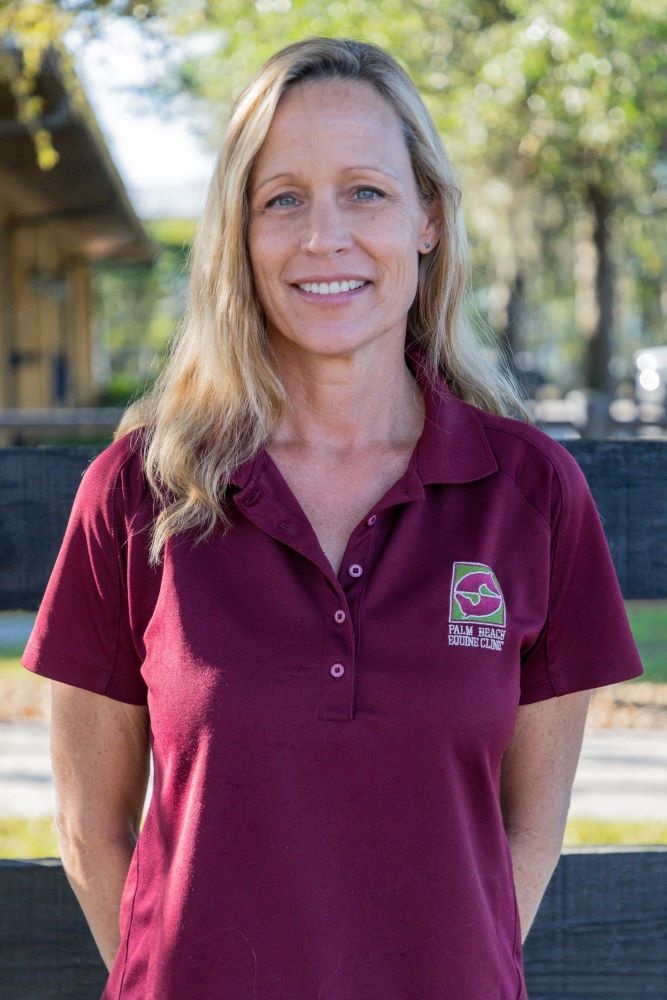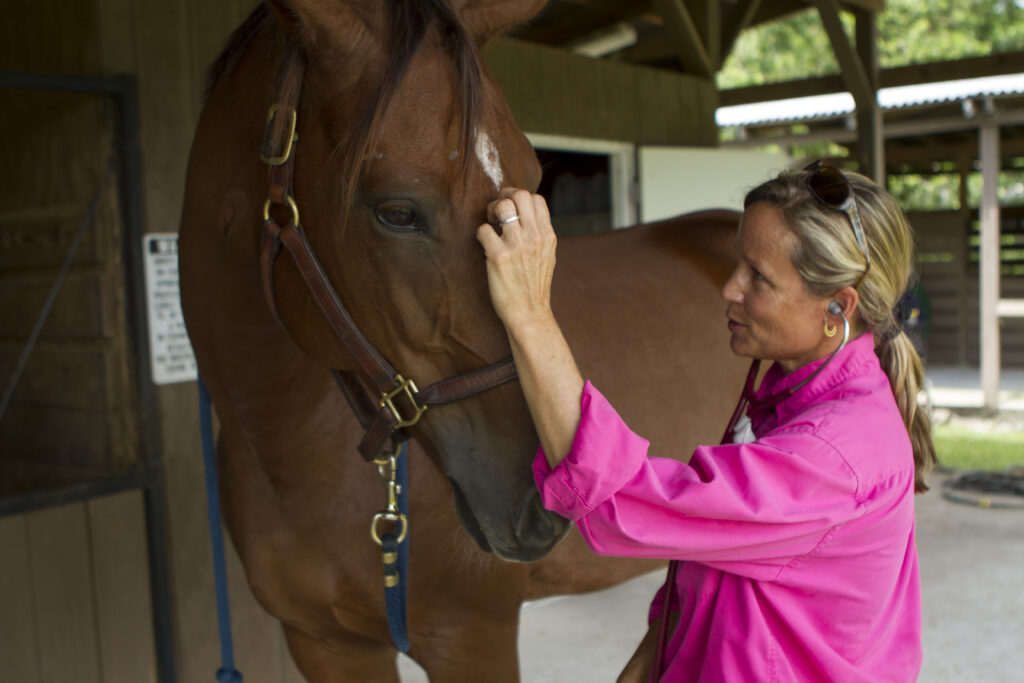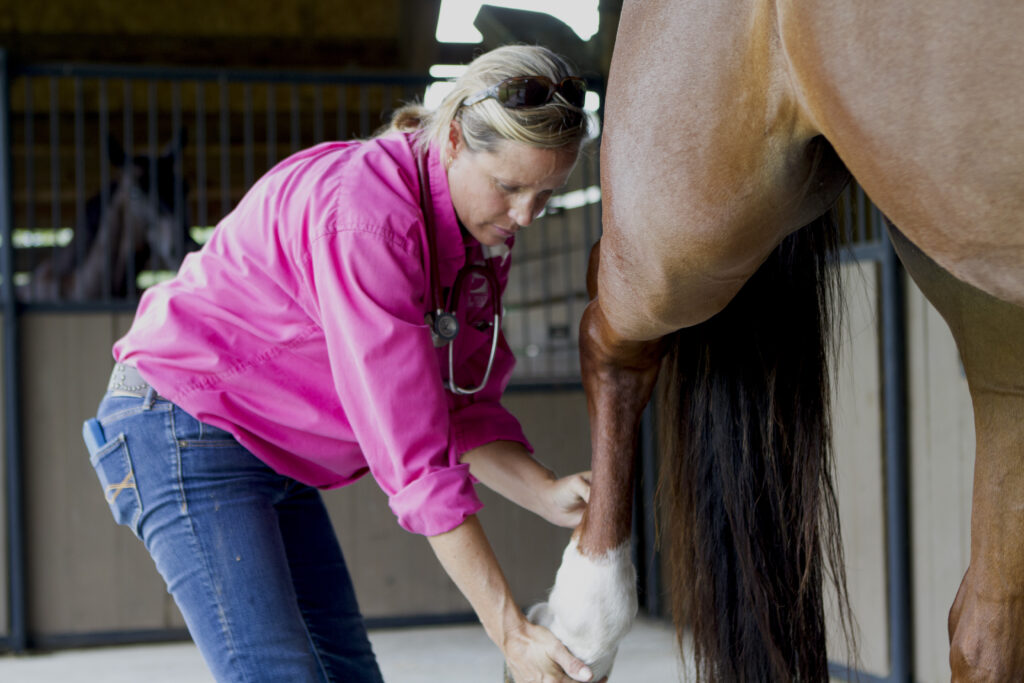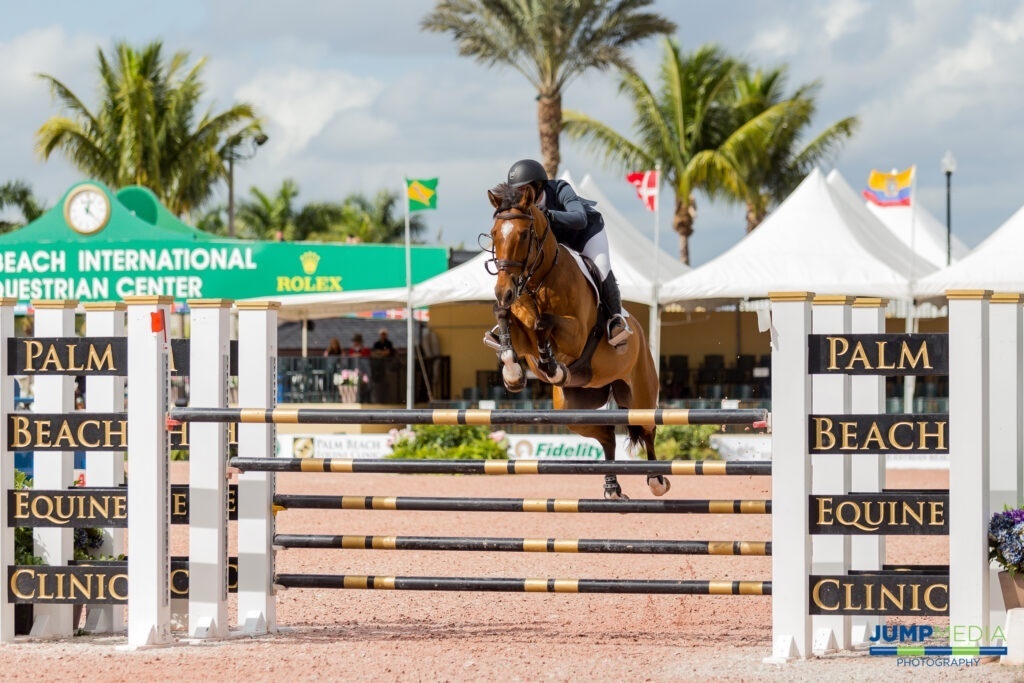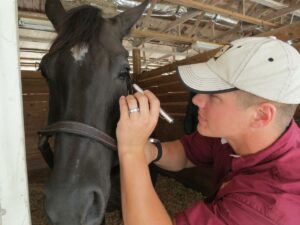Category: Team
Learn More About Surgeon Dr. Weston Davis
Dr. Weston Davis is a second-generation veterinarian from South Florida. His father is recently retired from veterinary medicine and his family raises beef cattle in Clewiston, FL. Dr. Davis graduated Magna Cum Laude from the University of Florida College Of Veterinary Medicine in 2008. He was awarded the Barbaro Gulfstream Scholarship (a veterinary scholarship named in honor of the amazing Barbaro), the Calder Race Course Scholarship, and the Student Award for Excellence in Large Animal Surgery.
After graduation, Dr. Davis completed his internship in Sports Medicine and Surgery at Oakridge Equine Hospital, followed by a residency in Equine Surgery at North Carolina State University. In 2012, he became board certified in Large Animal Surgery by the American College of Veterinary Surgeons. Before joining Palm Beach Equine Clinic, Dr. Davis spent 1.5 years as a staff surgeon at a private practice referral center in Texas. He has authored and co-authored publications on topics ranging from colic surgery to advanced imaging and novel surgical techniques. In 2014, he was awarded the BEVA Trust Peter Rossdale EVJ Open Award for a research publication on return to performance following colic surgery. He has spoken at several national and state meetings.
Dr. Davis is an avid sportsman himself, and his hobbies include fishing, hunting, waterskiing and almost any outdoor activity.
Tell us more about your background with horses growing up?
I started riding horses when I was so young I can’t remember. We had some amazingly kind horses that packed us around and took care of us (and a couple that didn’t). Riding as a child was mostly business – for the purpose of working cows. Somewhere around 14, I began team roping for pleasure and competition. I roped throughout college, but lost the required free time when I began practicing veterinary medicine. I’ll probably get after it again when I am retired and much too old to be doing that sort of thing!
When and why did you decide to become a veterinarian and why did you choose to pursue a career in surgery?
I decided to be a veterinarian very early in life.I had a father and uncle who were both successful and happy veterinarians whom I looked up to, so it was a logical path to follow. The surgical interests started as a kid watching my father do surgery, something I always thought was amazing and he was very skilled at. My decision to pursue the surgical avenue came during vet school when I realized that I wanted to specialize and knew surgery was my passion.
What is the best advice that your father has given you as a veterinarian?
My father is a man of few words. However, by watching him, I learned one of the biggest life lessons, which is to be calm and content with your career and your life.
What do you enjoy about speaking publicly and sharing your knowledge?
I think mentoring, sharing knowledge and teaching the hands-on skills to the next generation of veterinarians is one of the most fun and rewarding parts of my job. Observing a student as content and excelling in their career with a skill set that you contributed to, even in a small way, is a beautiful thing.
What is the most interesting or rewarding surgical case you have worked on?
Although minimally invasive arthroscopic type surgeries are my favorite to perform, I think colic surgeries are one of the most rewarding. They are often difficult surgeries and inevitably in the middle of the night, but you take a horse who would most certainly die without you, and save a life. Helping a horse who was in excruciating pain or has a life-threatening devitalized piece of intestine recover back to feeling comfortable and eating in their stall the next day is about as good as it gets.
What are your goals for your career now?
My goal is to expand the surgical and outpatient sports medicine referrals at PBEC. I am currently the coordinator for the intern and resident program. I plan to expand and improve on the quality of these mentoring programs within the industry. I am also working on the development and description of some novel minimally invasive surgical techniques. I aim to continue authoring 1-2 publications annually in the refereed equine literature.
When not roping, fishing, hunting or water-skiing, what other things do you do with your free time?
Most of my non-equine time lately has been devoted to some real-estate interests and house renovations. I am also a big reader.
The Growth of Palm Beach Equine Clinic
Jump Media interviewed Dr. Scott Swerdlin, DVM, MRCVS, and President of Palm Beach Equine Clinic to learn more about the Clinic’s simple beginnings and evolution into one of the largest veterinary practices in the United States.
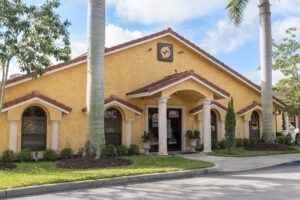
What was the genesis of Palm Beach Equine Clinic? Why was it started, how big was it, how many vets worked in the beginning, what kinds of services were offered?
In 1979, Dr. Paul Wollenman came to Wellington, Florida to principally care for Lion Country Safari’s exotic animals. Dr. Wollenman started to build the physical structure of Palm Beach Equine Clinic in 1981. I joined PBEC in 1983 and it was the beginning of a remarkable partnership. Mine and Dr. Wollenman’s strengths complemented each other well. I had recently resigned my Captaincy in the United States Airforce Veterinary Core and was excited to come back to where I grew up.
In 1991, we enticed Dr. Robert W. Brusie to join us from his successful surgical practice in Atlanta, GA. Dr. Brusie joined us to build the modern foundation of Palm Beach Equine Clinic. I was extremely fortunate to have these two extraordinary veterinarians as mentors. Shortly after Dr. Brusie joined us, we had an exceptional surgical service routinely treating colic cases and performing orthopedic surgeries. The final piece of the puzzle was to bring on a remarkable veterinarian from the next generation. We found that missing piece in 2003, when Dr. Richard Wheeler joined the team.
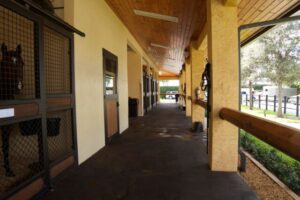
When did PBEC evolve into its current state?
The evolution of Palm Beach Equine Clinic has been constant and ever increasing. The growth of Palm Beach Equine Clinic mirrored the growth of the show horse industry through 2005. Ten years ago, we witnessed an exponential growth in the dressage discipline. From our simple beginnings, we now have twenty-eight veterinarians. What I take great pride in is my job is to keep twenty-eight veterinarians happy and explore additional opportunities to continue to grow and improve. Almost 30 years ago, Palm Beach Equine Clinic bought the first ultrasound for equine practice in South Florida. Twenty-five years ago, Palm Beach Equine Clinic installed the first gamma-ray camera to perform bone scans (Nuclear Scintigraphy). Twenty years ago, we developed Computed Radiography (CR) for horses. Currently, Palm Beach Equine Clinic has the most advanced state-of-the-art surgical and diagnostic imaging equipment for the horse. Onsite, we have a Hallmarq standing MRI unit, MiE gamma ray camera, Digital Radiography, Video Endoscopy, and a bevy of additional diagnostic equipment. Palm Beach Equine Clinic is dedicated to providing exceptional veterinary service for the horse.
What are the most important parts of PBEC?
No question, it is our staff. Palm Beach Equine Clinic is dedicated to providing a culture of respect and excellent communication. Palm Beach Equine Clinic encourages every technician and employee to embrace their position not just as a job, but as a career. Many of our technicians and administration staff have been a part of Palm Beach Equine Clinic for over 10 years. I want every person who works here to feel as though they are part of a team. Unequivocally, the most important part of Palm Beach Equine Clinic is its family of employees.
How was PBEC changed in the past several years?
Over ten years ago, we were fortunate to have Dr. Bill Patterson, Dr. Gary Priest, Dr. Bob Smith, Dr. Hilary Clayton, Dr. Jordan Lewis, and Dr. Kathleen Timmins join Palm Beach Equine Clinic to contribute to the culture and the success that we currently enjoy. In the past several years, we have added multiple, additional extraordinarily talented veterinarians. Dr. Jorge Gomez, Dr. Weston Davis, Dr. Sarah Puchalski, Dr. Bryan Dubynsky, Dr. Janet Greenfield, Dr. Tyler Davis, Dr. Daren Tamplin, Dr. Natalia Novoa, Dr. Ryan Lukens, Dr. Selina Passante-Watt, and Dr. Sarah Allendorf have all recently joined the Palm Beach Equine Clinic team within the past five years. We have updated all of our technical capabilities and we have added an Annex Office on the WEF show grounds in Wellington, Florida.
What do you see PBEC adding in 2016?
For Palm Beach Equine Clinic, 2016 will be an exciting year for expansion of our physical facility. Palm Beach Equine Clinic plans on adding an additional 4,000 square feet of air conditioned examination areas, an additional surgical suite and recovery stall, as well as climate controlled isolation quarantine stalls. Under the guidance of Dr. Sarah Puchalski, our in house Board Certified Radiologist, Palm Beach Equine Clinic hopes to add the first equine Computed Tomography service (CT scans) to our diagnostic imaging expertise.
Is there anything else you would like to add?
Palm Beach Equine Clinic owes all of its success to the horsemen and horsewomen of South Florida. We thank you for trusting our Doctors and staff with your precious family member, your horse. PBEC Veterinarians volunteer their time for many projects in our community. It is our pleasure to support Vinceremos Therapeutic Riding Center, Charity Challenge, One World, and many other local charities. Our doctors also contribute their time to providing veterinary care for the Winter Equestrian Festival and Global Dressage Festival as the Official Veterinarians. Palm Beach Equine Clinic is dedicated to providing exceptional care to your horse and is committed to improving our relationship with our clients, as well as our community.
Meet Dr. Janet Greenfield-Davis
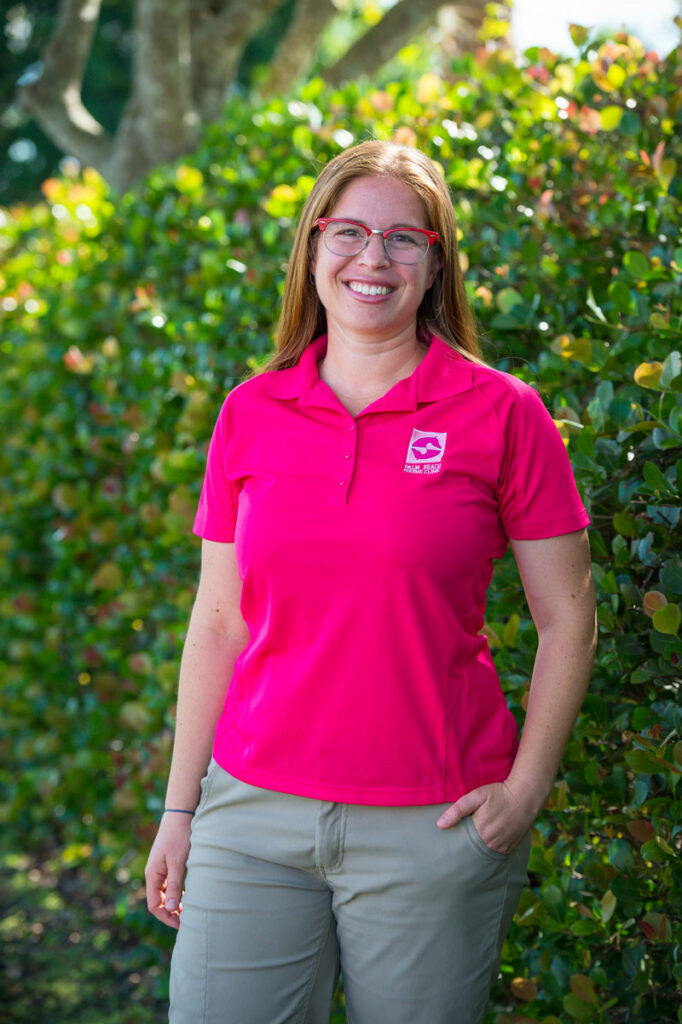
Dr. Janet Greenfield-Davis knew she wanted to be a veterinarian since elementary school. She grew up riding and competing on the hunter/jumper circuit in California before attending California Polytechnic State University and graduating from the University of Glasgow School of Veterinary Medicine in Glasgow, Scotland. Working alongside her husband Tyler Davis, Janet joined the Palm Beach Equine team as an intern before accepting a full-time position in 2010.
What inspired you to be a veterinarian?
I started riding at eight years old in a little field at the end of my street. As I started to grow up, my dad got me taking lessons and competing. He asked me one day when I was 11, ‘What do you want to be when you grow up’? I told him that I wanted to be a veterinarian and work on horses. He never let me forget that, so I grew up and became a veterinarian.
What is it like to work with your husband every day?
It’s wonderful. How many people can say that they get to see their significant other throughout the day, work on cases together, and bounce ideas off each other? We have worked together since the day we met. We went to school together, sat together in class and now we work together. I absolutely love it.
Have your children inherited the animal-lover gene?
Oh yes! We have two girls – Zella is two and Maisie is five months. Zella comes on calls with me regularly. She has her own toy stethoscope in my truck.
What is your specialty?
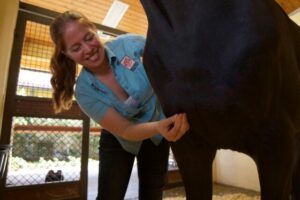
I specialize in acupuncture and herbal medicine. Both piqued my interest in vet school, and when I came to Palm Beach Equine, there was an opening for an acupuncturist. I really love having a way to treat animals without using drugs or steroids. It’s one more method to help equine athletes reach peak performance and is gaining more and more popularity. When I first started, people didn’t embrace it as much, but now even more doctors are starting to turn to it for cases they are not sure how to diagnose. With all the strict rules in FEI, it is a way to make a horse feel better without using drugs.
When you are not working, where can we find you?
Hanging out with my kids and my husband. We try to do family things as often as we can.
What advice would you give to someone considering vet school?
It’s a long, hard road but if you love it, it is so worth it.
What do you like about being on the Palm Beach Equine team?
We have all the diagnostic equipment we could ever need, and I love the quality of practitioners that we have at our practice. We always work as a team – everyone’s number-one goal is the best care for horses and animals in general.
Name one thing most people don’t know about you?
I used to swing dance. I taught lessons and performed for a long time.
Learn More About Dr. Kathleen Timmins
Dr. Kathleen A. Timmins is a 1993 graduate of the Ohio State University School of Veterinary Medicine. She completed her internship in equine medicine and surgery at the Illinois Equine Hospital near Chicago. Prior to coming to Florida, Dr. Timmins practiced in Aiken, South Carolina, where she met her husband, John Gobin, who plays polo professionally. Growing up in Central Ohio, Dr. Timmins began her relationship with horses as a child on the hunter/jumper circuit. She and her husband are enjoying parenthood with their daughter Schuyler.
Will you tell us more about your background riding on the hunter/jumper circuit?
I grew up in a family who was not involved with horses. At nine years old, I began showing in the hunters/ equitation locally in central Ohio and continued to ride until I went to college. I was fortunate enough to have a couple of nice junior Thoroughbred horses to show. I unfortunately don’t ride very much anymore. I have passed the reins over to my daughter, Schuyler. My daughter began riding at a young age on a medium pony that she has since outgrown. Schuyler is now 13 years old and rides a really nice green hunter. My husband is also a polo player, so she has been fortunate to have grown up with horses her entire life.
Were you involved with polo before you met your husband? How involved are you with the sport in Wellington?
I was working in Aiken when I met my husband. I came to Wellington with my husband in 1996 and that was also the year I started working for Palm Beach Equine Clinic. I currently have a nice mix of clientele in all disciplines located in both the Wellington/Virginia areas. My clients are mainly show horses; however, I do have many polo ponies as patients. I am also a member on the USPA (United States Polo Association) Equine Welfare Committee and Drugs & Medication sub-committee that authored the USPA Drugs & Medications Rules Book which was implemented a few years ago.
What do you enjoy about being part of the team at PBEC?
I love working at Palm Beach Equine Clinic. All the Doctors and staff are very supportive of each other and always willing to help. All the doctors have our own area of expertise and everyone is always willing to work as a team when necessary. There are many employees that have been there for many years. Additionally, I love having all of the technology available to help with all my veterinary cases. I have worked as an ambulatory tech practitioner in the past where I have had to refer cases to the local hospital. I like being on the referral end and receiving cases to help with rather than having to send clients off for various reasons.
When and why did you decide to become a veterinarian?
I was the kid following the vet around the barn when I was young. I was always seriously interested in the sciences and animals; combining the two passions seemed like a natural progression. I just came home one day and said to my mom, ‘I applied to vet school.’ I have never regretted my decision!
Do you have a specialty or main focus?
In my practice, I do a little bit of everything, but I enjoy the challenge of the difficult medical cases the best. I take many of the patients that enter the hospital, including the seriously ill ones such as pneumonias, colitis, kidney failures, or colics; the types of cases that require problem solving. At Palm Beach Equine Clinic Hospital, I can closely manage their care every day to hopefully recover successfully. I also like working with the geriatric animals. We have seen an increase in the senior performance animals and I enjoy working to keep them comfortable and happy.
Who has been the biggest influence in your life or career? What did they teach you?
It really hasn’t been any one person who influenced my career, it has been many. The truth is, you learn something or gain something from everyone, good, bad or otherwise. There are always lessons to be learned and you are always influenced a little bit by everybody in your life.
What are some of your other hobbies or interests?
During the summers when school lets out in Florida, my family travels to Middleburg, Virginia. My husband runs Great Meadow Polo Club and also has a polo school up there. I help him with the club when I’m there. I am licensed in VA so I can still work with my clients from the clinic there. We also travel to Aiken as we have a farm and clients there, but we don’t get there very often as we are so busy with the club in VA.
What is one of the most interesting cases you have worked on?
Recently, I had a racehorse filly with a case of multidrug-resistant pneumonia that was really tough to treat. Our team had to think outside the box from normal procedures to treat her, but it was successful! She recovered fully from her aggressive case of pneumonia and went home to her owners. In today’s veterinary world, horses, like people, are contracting these drug-resistant bacteria as well.
If you were not a vet, what would you be doing?
I would be a chef and run my own restaurant. I really love to cook, it is a passion of mine!
Is there anything else that people would like to know about you?
I am an FEI Veterinary Delegate for the past 10 years. I have many close contacts within the FEI and I am knowledgeable with all of their up to date rules. An FEI veterinarian is present at the shows to monitor the care of the horses.
Q&A with Dr. Bryan Dubynsky
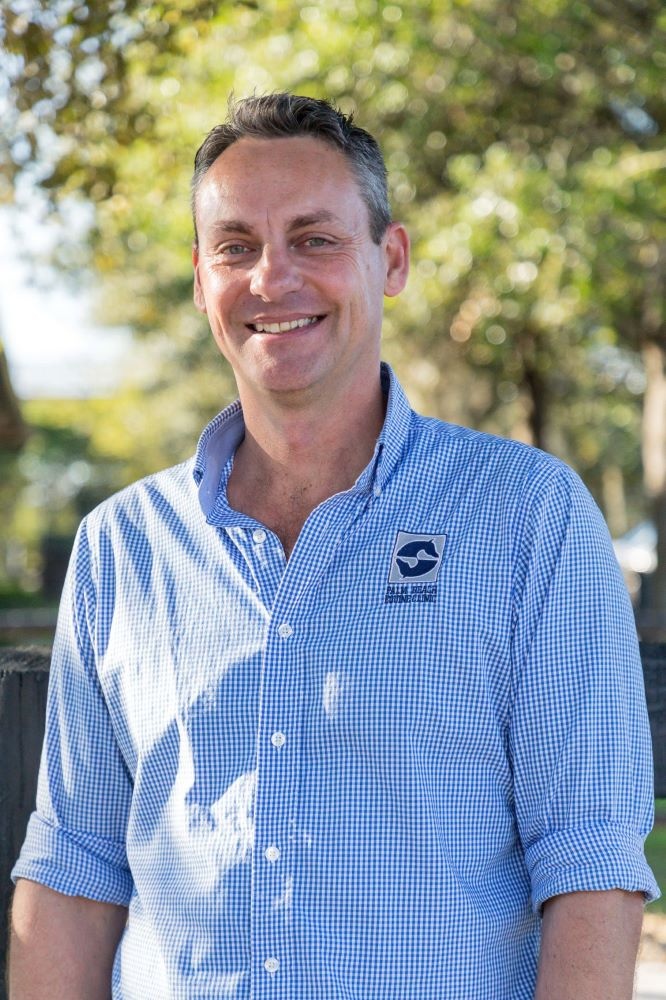
Get to Know Dr. Dubynsky
Q. Where did you grow up and what is your background with horses?
A. I grew up in Northern Indiana on a horse farm. I was fortunate enough to breed, show in the Midwest circuit, and train our horses.
Q. When and why did you decide that you wanted to become a veterinarian?
A. My father is a physician and I’ve always grown up with an interest in medicine. Choosing to become a veterinarian seemed to be a natural fit combining my love for horses and medicine.
Q. Who has been the biggest influence in your life or career? What did they teach you?
A. I spent my entire childhood from 8 to 18 years old with a third generation horse trainer from Kentucky. He taught me horsemanship and patience of which are two crucial foundations for successfully working around horses every day.
Q. What is your specialty/main focus as a veterinarian?
A. My main focus and interest is sport horse medicine. I love focusing on improving athletic performance and treating horse-related injuries to help clients get their equine partners back to the top!
Q. When did you join Palm Beach Equine Clinic and what do you like about working there?
A. I joined Palm Beach Equine Clinic in 2009. I love working here for the exceptional medical and surgical capabilities and experiences available. I also love the camaraderie of all the employees; we really work as a team! Teamwork is paramount for making the clinic successful.
Q. What is some advice that you would give someone who wants to become a veterinarian?
A. Pick out the top people in the industry and work with them. Learn as much as you possibly can from the people who have been practicing for a long time.
Q. What are some of your other hobbies or interests?
A. Polo, golf, guitar & music, hiking, seeing family and friends. Spending time with my lovely dog, Ginger.
Q. What do you love about your job?
A. I love the opportunities to travel all over the country and Europe to see really cool places to work with my clients. I love working with the competition horses and the atmosphere of high-level competition, as well as caring for the sweet trail horses at home.
Q. What is one of the most interesting cases you have worked on?
A. My horse Batman. He was an abandoned polo pony suffering from West Nile Virus. He was paralyzed for three days and no one wanted to treat him. We treated him with intensive care for three days and used a tractor as a last ditch effort to get him to stand. He has since made a full recovery and is currently playing polo.
As you prepare to compete, the partnership with your veterinary team is critical for your sport horse’s health and success. It is comforting to know that the finest equine hospital and sport horse care in the Southeast is less than one mile away from the Palm Beach International Equestrian Center and across the street from the Global Dressage Festival. The veterinarians and staff of Palm Beach Equine Clinic are respected throughout the industry for their advanced level of care and steadfast commitment to the equine industry and horse care.
Palm Beach Equine Clinic is proudly the Official Veterinarian of the Winter Equestrian Festival and the Global Dressage Festival, two of the world’s most competitive equestrian horse show circuits.
The team is onsite at all the competitions to provide veterinary services and is ready to step up in case of an emergency. This dedication has become invaluable over the years to many competitors that have needed their expertise in veterinary medicine.
As the consistent leader in sport horse medicine, Palm Beach Equine Clinic provides 24-hour coverage at their all-inclusive on-site hospital; complete with full surgical and internal medicine capabilities, laboratory, pharmacy and advanced diagnostic imaging center.
State-of-the-art diagnostic imaging services include:
- Standing magnetic resonance imaging (MRI)
- Nuclear Scintigraphy (bone scan)
- Digital ultrasonography and radiography
- Standing computed tomography (CT)
Furthermore, Palm Beach Equine Clinic performs thorough lameness examinations, extensive pre-purchase/pre-lease evaluations, dentistry, podiatry consultation, and complete reproductive services. Palm Beach Equine Clinic also provides alternative medicine services such as chiropractic and acupuncture therapies, as well as, resourceful preventative medicine programs.
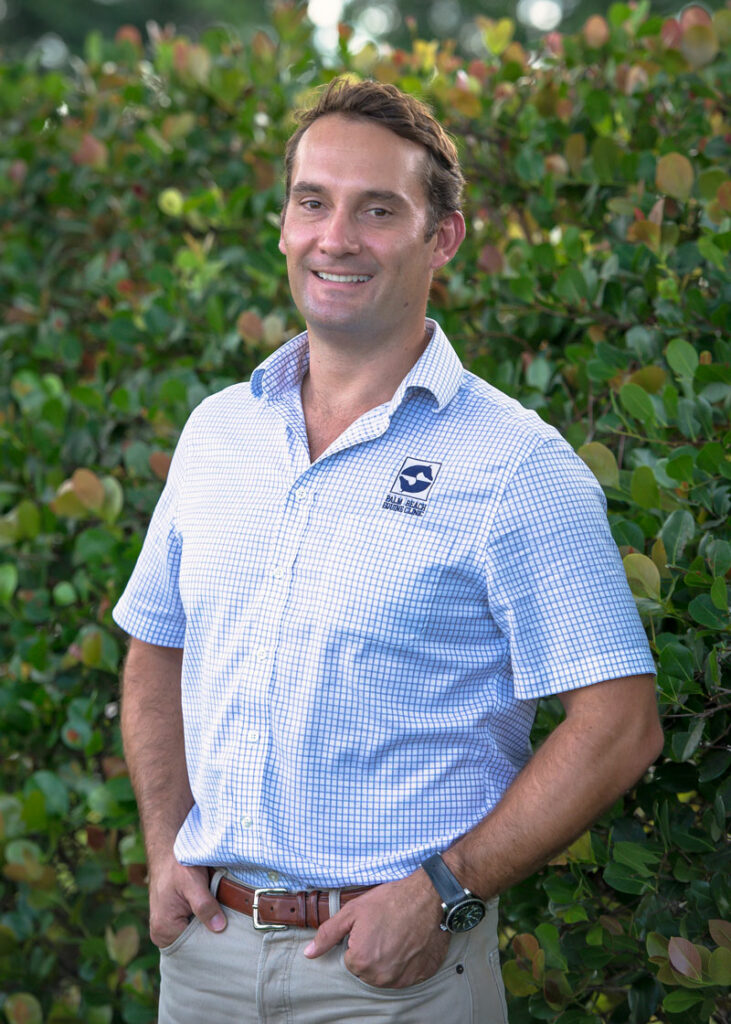
The veterinarians of Palm Beach Equine Clinic are are top-level academics frequently published in popular equine magazines and national veterinary journals. One of the more recent members to the Board of Directors at the Palm Beach Equine Clinic is Dr. Richard Wheeler, whose primary area of interest is equine lameness and sports medicine. He is passionate about his role in maintaining sport horses to enjoy a long and successful career.
What are the latest innovations that allow you to administer cutting-edge care to sport horses?
Dr. Richard Wheeler: There are many exciting new developments in equine sports medicine. The addition of imaging modalities such as magnetic resonance imaging (MRI) and computed tomography (CT) together with recent improvements in digital radiography, ultrasound and Nuclear Scintigraphy allow us to be more specific with our diagnoses and image areas of the horse that we were previously unable to image. Furthermore, regenerative therapies such as platelet rich plasma (PRP), bone marrow concentrate and the use of stem cells offer exciting opportunities with regard to the treatment of a wide variety of conditions, including soft tissue and joint injuries.
What do you find separates the most successful equine competitor from the rest?
Dr. Richard Wheeler: Across the field of disciplines, I believe attention to detail and a good team are the most important factors. As a veterinarian, I try to work closely with the owner, rider, trainer, farrier, groom and often many other support staff members. I will often examine the high level horses every week during the intense winter season and we will work together to make subtle adjustments to keep the horse performing at their very best.
How do you feel about your move to the USA and Palm Beach Equine Clinic ten years ago?

Dr. Richard Wheeler: Time has gone fast! There is nowhere in the world like Wellington, Florida, it is a wonderful place to live and practice veterinary medicine. Palm Beach Equine Clinic is an amazing family with a wealth of experience and knowledge to draw on. I think our greatest strength is our team approach; we will spend hours discussing and debating the best approach to cases and I think this is incredibly valuable to our clients. It is of great value to me as a veterinarian to have the high quality equipment we have invested in as well as the support of our Board Certified Surgeons (Drs. Brusie, Gomez and Davis) and our Board Certified Radiologist Dr. Puchalski. I am a strong believer in developing a specialty as a veterinarian so having the depth of support at Palm Beach Equine Clinic allows me to concentrate on lameness and sports medicine with the capability to provide my clients with doctors who specialize in other areas such as alternative therapies, reproduction and dentistry.
Dr. Wheeler’s extensive experience with a variety of equine performance sports advanced after graduating from the Royal Veterinary College in London in 2002. Dr. Wheeler completed an internship at the world-renowned Newmarket Equine Hospital, specializing in surgery and sports medicine, before moving to Palm Beach Equine Clinic in 2005. Licensed to practice in Florida, Kentucky and New York, as well as the United Kingdom and Europe, Dr. Wheeler is an FEI official veterinarian. A horseman himself, Dr. Wheeler has competed in a variety of equine sports including eventing, dressage, show jumping and polo.
Many international Grand Prix riders, such as one of the United States’ top Dressage riders, Tuny Page, attributes the health and soundness of her horses to Dr. Wheeler and the Palm Beach Equine Clinic team.

“Richard is a fine veterinarian with great depth of experience and super instincts. On top of that, he communicates beautifully with me as the client and my grooms as my horse’s managers. Richard is very secure in his positions about diagnosis and treatment of the horses, which allows him the ability to communicate openly with other veterinarians and therapists. This works particularly well when I am traveling with the horses and need to have open communication between other veterinarians and Richard. Richard has always treated my staff with the respect and integrity they deserve and the result is tremendous trust within our team. The most important recommendation for Dr. Wheeler is, quite simply, that my horses are happy, healthy and sound.”
International Grand Prix Dressage Rider Tuny Page
Additionally, International Dressage star, Mikala Munter (DEN), who recently won the FEI Grand Prix Freestyle CDI 4*, knows the importance of equine health and states praise for Dr. Wheeler.
“Dr. Wheeler from Palm Beach Equine Clinic has a good eye and feel for what a horse needs, and he is the best veterinarian for a sport horse”
International Grand Prix Dressage Rider Mikala Munter
Palm Beach Equine Clinic is committed to provide care for your equine athlete throughout the year and across the globe, and support at shows across the USA, Europe and South America.
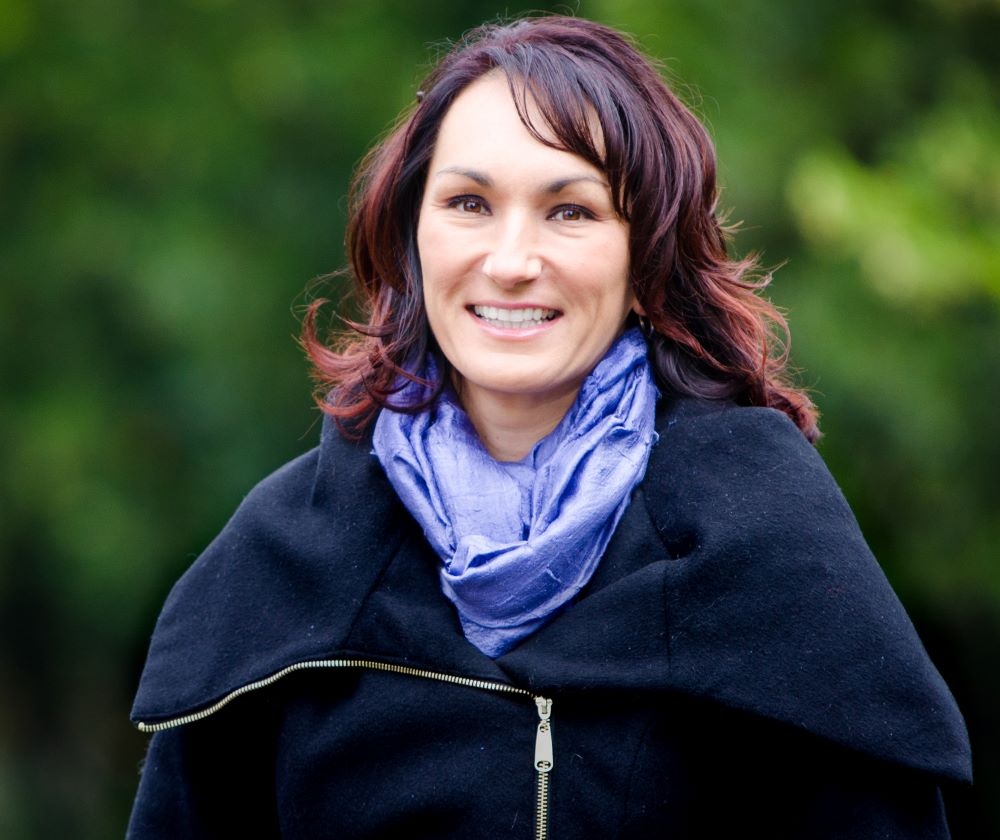
Dr. Sarah Puchalski is a Diplomate of the American College of Veterinary Radiology whose specialty includes the interpretation of bone scans, MRI, ultrasound, radiographs and other diagnostic imaging techniques. With her addition to the staff, Palm Beach Equine Clinic is one of the few equine hospitals in the country to employ a full-time radiologist on-site. In addition to working with horses locally and assisting veterinarians around the world, Dr. Puchalski also competes in the Medium and High Amateur Owner Jumper circuits.
It is important for clients to get know our doctors so we asked Dr. Puchalski to share a little about herself!
How do you like being in Wellington and having the opportunity to compete at the Winter Equestrian Festival?
I think it is a really unbelievable opportunity to ride in the most competitive rings in the country regardless of the level at which you are competing.
How do you like working at Palm Beach Equine Clinic?
Palm Beach Equine Clinic is great place to work. It is very vibrant and busy. I like the energy that comes out of the place and the imaging equipment is world-class.
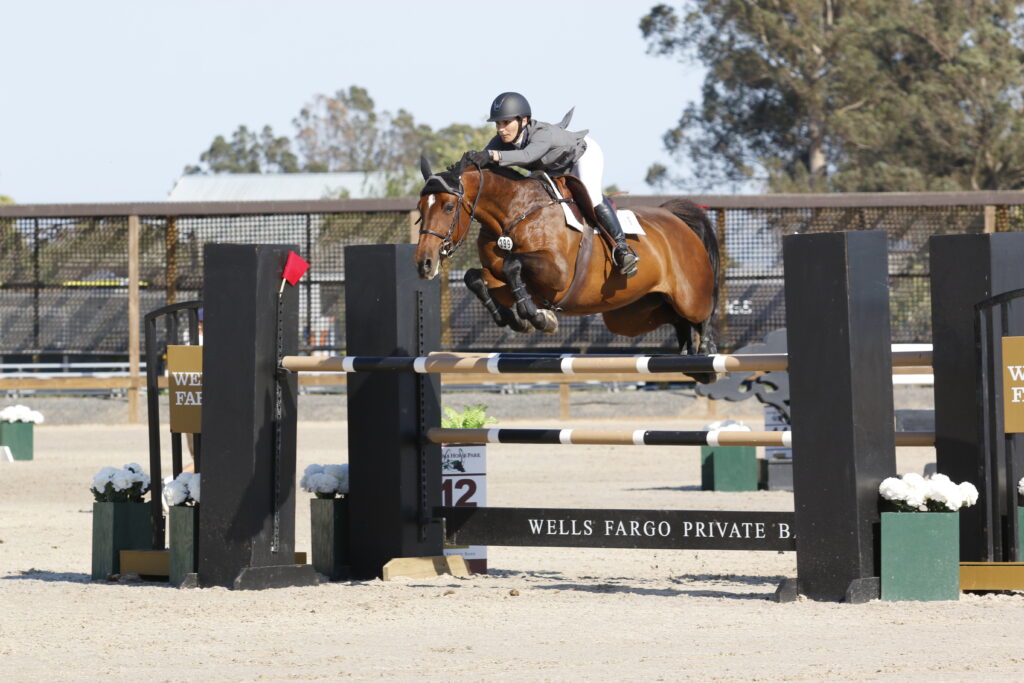
Why do you feel it is important to have a Board Certified Radiologist on site?
My full time job is image reviews which takes a high level of specialization. This provides support for all veterinarians ranging from field veterinarians to surgeons. It is very rare for an equine hospital to have a full-time radiologist so having one on board offers a step up in the quality of service. When a horse comes in for an MRI or bone scan everything can be reviewed before the horse leaves the clinic so if any other care is needed it can be handled in one visit.
What ways do veterinarians use radiologists?
There are a couple ways. One is that I read complicated images such as bone scans and MRIs. Most veterinarians do not have the training to read these images. The second way is to provide a second opinion on routine diagnostic techniques such as radiographs and ultrasounds. Clients and referral veterinarians will also use my opinion for pre-purchase examinations.
Tell us about your studies and how you’ve developed an international reputation?
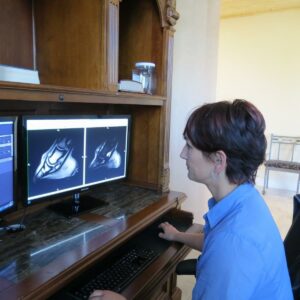
I did two internships in field service and sports medicine at New Bolton Center Hospital at the University Of Pennsylvania School Of Veterinarian Medicine. Then, I spent four years at the University of California, Davis in imaging. For eight years I stayed there as faculty for doing research instruction and clinical service. I have published more than 50 scientific articles and performed over 100 presentations around the world on lameness diagnosis and Diagnostic Imaging in Sport Horses.
What would you like veterinarians and owners to know about you?
My philosophy is to support all veterinarians, whether it be a veterinarian from Palm Beach Equine Clinic or a referral. I read cases from all over the world on a daily basis. Many owners ask their veterinarian to consult with me for a second opinion. I view my role more as a support role for all veterinarians to provide the best care for horses.
Introducing Dr. Ryan Lukens
Dr. Ryan Lukens joined the Palm Beach Equine Clinic team in June of 2012. He has been a great asset and some of you may not have had the opportunity to meet him.
Palm Beach Equine Clinic currently has 24 veterinarians providing exceptional veterinary care and client services. As we grow, thanks to our clients, we feel it is important that everyone gets to know our veterinarians. Not only professionally, but also personally. Each of our doctors brings exceptional veterinary skills and great personal strengths to our Palm Beach Equine Clinic Family. It is the combination of these strengths that makes our Team a success.
We sat down to interview Dr. Lukens and asked him to tell his story.
Q: You went to Ohio State and played football, do you feel that your football career helped you with your future in veterinary medicine?
A: Yes, I played football for 5 years at Ohio State, from 2004 to 2008. I was a fullback and a linebacker. My senior season was my freshman year in veterinary school. I remember studying for Cell Biology and Clinical Pathology during my plane rides back from games.
My coaches were very accommodating. I would usually have to skip Sunday film day to study for Monday exams and then make up film review after my exams on Monday, which would usually have been a “day off” from football. Needless to say I was busy during that first quarter of vet school. Football taught me discipline and time management.
My Coach, Jim Tressel, instilled values in his players by group discussion and study of leadership books. These values affect my career today, I am always aware of how my actions and words affect everyone around me. The lessons from Coach Tressel have helped me improve my communication skills with my clients and fellow colleagues.
Q: Your wife is a small animal veterinarian, how did this play a part in your education and career?
A: My grades were above average during my last football season but improved the following quarter. This improvement in grades can be traced back to meeting my future wife in school a month after my football career ended. The day we met we spent most of our time studying together and immersing ourselves in our class work.
Studying became fun and we tackled the challenges together. She was small animal oriented and I was able to teach her equine aspects while she helped me with small animal based courses. From our separate experiences working with different animals our entire pre-vet school lives, we greatly improved each other’s understanding of former less-familiar species.
When we entered clinical rotations our 3rd year, I would always find a way to get out to the barn rather than stay in the small animal clinic. It was fun being able to teach my wife about horses, she had almost no experience with horses when we met.
Q: How do you feel about being a part of the Palm Beach Equine Clinic team of doctors? What kind of experiences have you had since joining PBEC?
A: I am more than happy to be a part of this prestigious clinic and to live in the center of horse country in South Florida. I do not miss lameness exams in the snow! I started working at Palm Beach Equine Clinic for over 6 weeks while I was finishing school. This opportunity led to a great start in my career. I was able to familiarize myself with the operation of this efficient, tertiary medical facility.
My interests in school and to this day are sports medicine and I always envisioned performing competent lameness exams. Over the past year and a half, my lameness exam numbers have increased exponentially. This past winter season I was successful in keeping several horses that had lameness issues early on sound throughout the entire season. I enjoy doing pre-purchase examinations. I am fortunate that this area offers a great amount of sale horses. Pre-purchase exams are also an excellent way to develop relationships with new riders and trainers.
Moving from Ohio, I was quickly introduced to “summer sores”. Habronemiasis (summer sores) are not seen clinically in the north. So becoming more educated on them and providing successful treatment has been an educational experience for me.
A fortunate part about being a team member is the number of doctors and specialized fields that Palm Beach Equine Clinic offers. This is what makes the veterinary care here so proficient. It benefits the patient and client as we are able to share ideas and consolidate treatment options amongst our large team.
Q: What are your goals for the future?
A: I am currently working on becoming ISELP (International Society of Equine Locomotor Pathology) certified. This course and certification will continue to expand my knowledge and treatments of lameness. I look forward to meeting new clients and treating new horses. In the future, I want to join the ranks of the lameness experts known throughout the country. Wellington is one the greatest places in the world for the opportunity to treat the best horses in the world. I wouldn’t want to be anywhere else.

